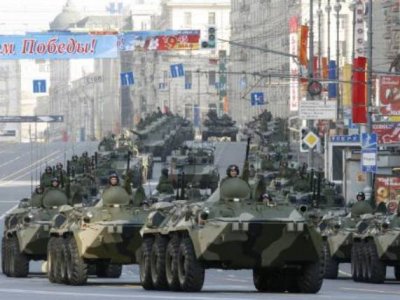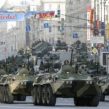
Russia’s Fog of Military Reform
Publication: Eurasia Daily Monitor Volume: 8 Issue: 46
By:

The Russian defense ministry plans to convene a broad-based meeting on March 14 to discuss the results of military reform and its prospects during the next decade. On March 3, Viktor Ozerov, Chairman of the Federation Council’s Defense and Security Committee confirmed that the full committee has been invited to attend the meeting, which will hear detailed reports from Defense Minister, Anatoliy Serdyukov, the Chief of the General Staff, Army-General Nikolai Makarov, First Deputy Defense Minister, Vladimir Popovkin and other defense officials. A preparatory meeting on March 1 discussed the new joint-strategic commands, command and control and the development of non-commissioned officers (NCO’s) (Interfax, March 3).
Attendance by the leading personalities involved in the reform raises the profile of the meeting, and brings into focus underlying reasons to hold such “public consultations” more than two years after initiating the reform, and in the context of reform in perpetuity –or at least until 2020. Serdyukov and Makarov, representing a defense tandem mirroring the duumvirate, seek to shirk responsibility for the countless errors accumulated along the way. The reform promised great advances based on using foreign military experience and reorienting the Russian armed forces to meet modern challenges. Colonel Yelena Knyazeva, acting chief of the defense ministry’s Main Directorate for International Military Cooperation, in an interview in Indeks Bezopasnosti stated: “We study foreign armies’ experience not in order to copy it but in order to analyze and adapt it to present-day Russian realities.” Knyazeva cited as an example of this approach the organization of NCO training. Unfortunately, either she was misinformed or deliberately attempted to talk-up non-existent progress in this critical area. The current effort to train professional NCO’s at a specially designed course in Ryazan has all the hallmarks of another in a series of failed experiments (https://pircenter.org/data/publications/sirus1-11/Interview-Knyazeva.pdf, February 2011).
Major-General (retired) Vladimir Dvorkin, chief research officer at the Institute of World Economy and International Relations, and former head of the defense ministry’s 4th Central Research Institute, characterized the reform as being accompanied by “organizational blunders,” damaging morale among servicemen which had inadvertently resulted from officer downsizing. Dvorkin stated that highly professional officers involved in planning combat operations have been removed. Within defense ministry research institutes, Dvorkin said the situation was chaotic, noting that “one minute, a full switch to civilian employees is announced, and officers are dismissed; the next minute, an order comes through once again to keep the officers on.” The original target to reduce the officer corps to 150,000 was apparently planned without any reference to officers taking leave, or the need to cover sick leave. Dvorkin concluded that the mistakes in the reform demonstrate the “lack of any discernible conception of, and strategy for, military reform, both before it started and during it,” adding “the objectives are being attained, as always, with losses. The reasons have long been known. Everything is decided within a restricted circle of senior officials that does this without any feasibility studies or independent research” (Interfax, February 26, March 2).
Colonel-General (retired) Eduard Vorobyev, former first deputy commander-in-chief of the Ground Troops concurred with Dvorkin, also highlighted the serious implications of the muddle and confusion that has marked the conduct of the reform: “Many decisions, including important ones, are taken rashly, hastily and impulsively, without due argument or taking account of public and expert opinion” (Interfax, February 26, March 2). After all the statements from Serdyukov and Makarov to justify the officer downsizing in terms of the need to make the structure of the armed forces less top-heavy and improve the standards of serving officers, in February 2011 the process was suspended. The target for the officer corps is now 220,000, and with it the top-heavy nature of the armed forces is guaranteed to endure. Whatever the original reform agenda envisaged is no longer being pursued. A variant of the “new look” is under construction, and will likely only emerge after the presidential election in March 2012.
Meanwhile, the defense ministry has succeeded in transmogrifying the phrase “fog of war” into the “fog of reform,” which is not a politically sensitive issue in Russia unless it is linked to money. Serdyukov has therefore yet to explain the numerous procurement failures in 2010. While Moscow trumpets a high-profile 19.4 trillion rubles ($688.35 billion) rearmament program for the defense ministry over the coming decade, insufficient levels of new equipment and weapons are reaching the armed forces. In Vedomosti, Aleksey Nikolskiy stressed the constant nature of such setbacks, notably in the defense industry only producing five of the planned 11 satellites, project 677 new diesel-electric submarines are on hold, and tests on Su-35 fighters for the air force have experienced delays (Vedomosti, March 1). Nine Yak-130 training aircraft were ordered and six arrived; 151 BMP-3 combat vehicles were ordered and 78 were received. Serdyukov has advocated tightening the system to include fines and arrests as punishment for defense companies. One defense industry director estimates the overall low profitability of the industry at 6 percent to 7 percent, and suggests this will further decline, though offering no explanation on how this profitability is measured or the deeper problem of price monitoring having been abolished in 1984 (https://www.newsru.com/russia/02mar2011/screwup.html, March 2).
Some observers argue that the military is unimportant to Putin, which may be questionable given its usefulness in the early days of his presidency in re-launching war in Chechnya, or the speed at which he left the Beijing Olympics in 2008 to return to oversee the crisis with Georgia. However, Putin shares with the siloviki the belief in Russia as a great power, which may require a stronger military to support an assertive foreign policy. His reputation as the “father of the nation” and claims to protect the territorial integrity of the Russian Federation also require some semblance of military support, particularly if the insurgency in the North Caucasus continues to escalate. Putin has known for many years that only a small portion of the military is combat capable. Should Putin return to the presidency his priority in the reform would be to ask the General Staff what is required conventionally to inflict a “bloody nose” on Russia’s enemies; western military standards may not be the answer.




